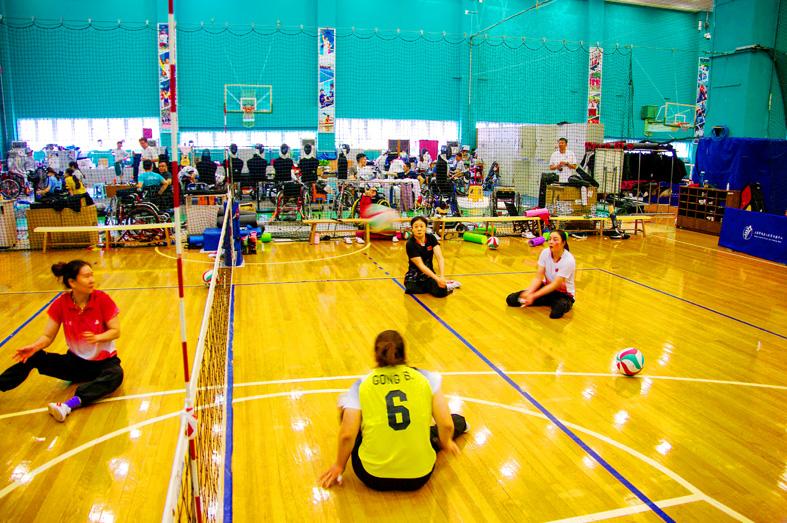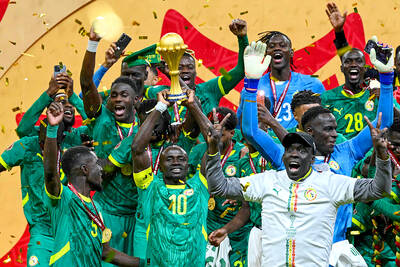Tang Xuemei was just a teenager when her school dormitory began shaking violently before the floor crumbled in a powerful earthquake, sending her spiraling into a dark void.
Thirteen years on from the trauma of losing part of her leg in a disaster that left nearly 90,000 people dead or missing, she is a Paralympic gold medalist and is to again represent China in Tokyo in sitting volleyball.
She will do so with a smile on her face and a resounding message for others with disabilities.

Photo: AFP / China’s Sitting Volleyball Women’s Team
“We are no worse than others,” said Tang in written remarks, while taking time out of training in Shanghai for the upcoming Paralympics.
“Even if we have such an unfortunate experience, we will still face it with a smile and work harder and bravely to pursue our dreams,” she said.
The magnitude 7.9 Sichuan earthquake of 2008 is seared into China’s collective memory not only because so many people died, but also because children and teenagers, including Tang, were prominent among the victims.
An outpouring of grief soon turned to fury as it emerged that thousands of children were killed in 7,000 schools that collapsed, sparking allegations that corruption had led to shoddy building work.
Now 27, Tang declined to answer questions about the fateful moment the quake brought her school down — the issue remains highly sensitive in China.
In a recent interview with the official Web site of the International Paralympic Committee (IPC), she described in detail the experience of running for her life and the dormitory floor disappearing beneath her feet.
When she came to, the then 14-year-old found herself buried, her left leg pinned down by rubble.
She would wait in eerily dark silence for 28 hours before she was rescued.
“Between life and death, you only think of the people that matter to you the most,” Tang told the IPC.
“And thinking of my parents, I knew that I cannot die, I had to live,” she added.
Tang says matter-of-factly that she had part of her leg amputated, and that “the state provided help for the children affected by the earthquake.”
Her comments masked the heartache that came with that life-changing decision.
Her parents begged doctors not to amputate, fearing what kind of future Tang would have as a disabled person.
In the end, it was the teenage Tang who told them that if they did not sign the consent form, she would sign it herself because she feared she would die without the operation.
With her impairment, Tang became withdrawn, her path in life unclear. Tang picks up the story of what happened next and how it ultimately led her to where she is today — a gold medalist at London in 2012 and eyeing more success in Tokyo.
“I put on a prosthetic limb and the joy of standing up again alleviated my worries about the future,” she said.
“Fortunately, I came across sitting volleyball by chance after taking part in a competition for disabled children and teenagers,” she said.
Tang, who had always been sporty, was immediately struck by the confidence the young volleyball players exuded despite their disabilities.
She would later go on to win a place on Shanghai’s sitting volleyball team and honors followed with China, who should be serious title contenders again in Tokyo.
Tang is relishing the prospect of “winning glory for my country.”
More than that, sitting volleyball gave her renewed self-worth and she sees the Paralympics as “a higher platform to realize more the value of life.”
“Sport can help us rehabilitate physically and mentally,” she added.

The Philadelphia 76ers, fueled by 36 points from Tyrese Maxey and a triple-double from Joel Embiid, on Thursday beat the Houston Rockets 128-122 in an NBA overtime thriller. Cameroonian big man Embiid scored 32 points, grabbed 15 rebounds and handed out 10 assists, posting the ninth triple-double of his career to help the Sixers end the Rockets’ three-game winning streak. Rockets star Kevin Durant scored 36 points and Amen Thompson added 17, but Thompson was scoreless in the fourth quarter. Even so, the Rockets led by nine midway through the final frame, Maxey tying it at 115-115 with 40.1 seconds left. Durant missed a

MARRED FINAL: As most of Senegalese players walked off the pitch after a controversial decision, some supporters threw objects and attempted to get onto the pitch Senegal on Sunday won the Africa Cup of Nations (AFCON) as Pape Gueye’s extra-time winner sunk hosts Morocco 1-0 after a chaotic final that saw the eventual champions storm off the pitch late in the game. Brahim Diaz could have won the trophy for Morocco with a controversial spot-kick in the 24th minute of added time at the end of normal time as ugly scenes broke out in the stands. However, Senegal goalkeeper Edouard Mendy easily saved the weak attempted “Panenka” chip by the Real Madrid winger, who was clearly distracted by the long delay that followed the penalty award.

Tobias Harris on Monday scored 25 points as the Detroit Pistons held off the Boston Celtics to score a 104-103 victory in their top-of-the-table Eastern Conference showdown. Harris was one of four Detroit players to finish in double figures, with Jalen Duren adding 18 points and point guard Cade Cunningham scoring 16 points with 14 assists. The win sees Detroit extend their lead at the top of the Eastern Conference to 31-10, 5.5 games ahead of second-placed Boston, who fell to 26-16 with the defeat. Jaylen Brown led the Celtics scoring with 32 points and almost snatched victory in the

The civil war engulfing tennis has been laid bare on the opening day of the first Grand Slam event this year, with details of Tennis Australia’s peace deal with the Professional Tennis Players’ Association (PTPA) published for the first time. The PTPA last year launched an anti-trust lawsuit against the four grand slam tournaments, the ATP Tour, WTA Tour, and the International Tennis Federation, accusing them of collaborating to reduce prize money, impose a restrictive ranking system and repress player promotional opportunities, but Tennis Australia was dropped from the claim last month after reaching a settlement agreement with the players’